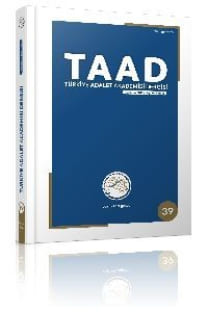ÖZEL BİR ADLİ YARDIMLAŞMA TÜRÜ OLARAK ORTAK SORUŞTURMA EKİPLERİ OLUŞTURULMASI
Sınır aşan suçlara karşı ulusal ölçekli mücadele araçlarının yetersiz kalması, ulusla- rarası alanda yeni ve etkili arayışlara neden olmuştur. Bu konuda ortaya çıkan önemlikurumlardan biri de, özel bir adli yardımlaşma türü olan Ortak Soruşturma Ekiple- ridir. Düşünsel temelleri XX. Yüzyılın ikinci yarısına kadar uzanan Ortak SoruşturmaEkipleri, ilk defa Avrupa Birliği ve Avrupa Konseyi tarafından hazırlanan adli yardımlaş- ma anlaşmalarıyla hukukî varlık bulmuş ve Avrupa Birliği üyesi ülkeler arasında uygu- lanmaya başlanmıştır. Ortak Soruşturma Ekiplerinin, Türk Hukukunda henüz normatif bir dayanağı bu- lunmamaktadır. Bununla birlikte, yakın gelecekte özel bir adli yardımlaşma türü olarakHukukumuza girmesi kuvvetle muhtemeldir. Bu nedenle Çalışmamızın amacı, OrtakSoruşturma Ekiplerinin ortaya çıkışı ve hukukî temelleri yanında, sınır aşan suçlarlamücadelede ne şekilde kullanılabileceği ve bu yönde sağlayabileceği yararlar ile ne- den olabileceği sorunlar hakkında genel bir bilgi sunmaktır.
Establishing Joint Investigation Teams as a Type of Special Legal Assistance
As the means for fight against cross-border offences was insufficient in nationallevel, new and efficient means in international level have been searched. One of thesignificant institutions arising in this area is Joint Investigation Teams which is a spe- cial type of legal assistance. Joint Investigation Teams of which intellectual origins goback to second half of the XXth century obtained its existence with the legal assistan- ce agreements drawn up by European Union and Council of Europe and it has startedto be implemented among the Member States of European Union. Joint Investigation Teams do not have any normative basis in Turkish law yet. Inaddition, it is most likely that it will enter into our law in the near future as a specialtype of investigation and legal assistance. Thus the aim of our study is to provide ge- neral information on the emergence of the Joint Investigation Teams and their legalbasis, as well as how they can be used in the fight against cross border offences andtheir possible advantages and the problem they might cause.
___
- BOISTER, Neil. ‘An Introduction to Transnational Criminal Law’, Oxford University Press, Oxford, 2012.
- DE BUCK, Bart. Joint Investigation Teams:The participation of Europol Officials, Academy of European Law, ERA Forum (2007) 8.
- GUALTIERI, Claudia. Joint Investigation Teams, Academy of European Law, ERA Forum (2007) 8.
- HELMBERG, Monika. Eurojust and Joint Investigation Teams: How Eurojust can support JIT’s, Academy of European Law, ERA Forum (2007) 8.
- LILOVA, Marina. Joint Investigation Teams (JIT) The Role of Eurojust and Europol in establishing and supporting JIT’s, Ohrid 2009. http://www.rai-see. org/doc/
- NADELMAN, Ethan A. ‘Cops Across Borders, The Internationalization of U.S. Criminal Law Enforcement’, The Pennsylvania State University Press, Pennsylvania, 2003.
- PRECHAL, Sacha. Directives in EC Law, Oxford University Press, Oxford 2005.
- RIJKEN, Conny and VERMEULEN, Gert. Joint Investigation Teams in the European Union form Theory to Practice, T.M.C. Asser Press, The Hague, 2006.
- SPAPENS,Toine. ‘Joint Investigation Teams in the European Union: Article 13 JITS and the Alternatives’, European Journal of Crime, Criminal Law and Criminal Justice, 19, 2011.
- SCHALKEN, T and PRONK, M. ‘On Joint Investigation Teams, Europol and Supervision of Their Joint Actions’, European Journal on Crime, Criminal Law and Criminal Justice, 2002, Vol. 10/1.
- TEZCAN, Durmuş/ERDEM, M. Ruhan/ÖNOK, R. Murat. ‘Uluslararası Ceza Hukuku’, Seçkin Yayınevi, Ankara, 2009.
- Conclusions of the Second Meeting of the National Experts on Joint Investigation Teams, Council Document 15023/06, 21 November 2006.
- Council of the European Union, The Stockholm Programme - An open and secure Europe serving and protecting the citizens, 17024/09, 2 December 2009, Brussels. http://eur-lex.europa.eu/LexUriServ/LexUriServ.do?uri=OJ:- C:2000:197:0001:0023:EN:PDF
- Council Framework Decision of 13 June 2002 on Joint investigation teams, OJ l 162 of 20. 6. 2002, http://eur-lex.europa.eu/legal-content/EN/TXT/PDF/?uri=CELEX:32002F0465&from=EN
- Council Act of 28 November 2002 drawing up a Protocol amending the convention on the Establishment of a European Police Office (Europol Convention) and the Protocol on the Privileges and Immunities of Europol, the Members of its Organs, the Deputy Directors and the Employees of Europol, OJ c 312 of 16. 12. 2002, p. 1.
- Council Recommendation of 8 May 2003 on a model agreement for setting up a Joint investigation team (Jit), OJ c 121 of 23. 5. 2003, p. 1.
- Agreement on Mutual Legal Assistance Between the European Union and the United States of America, OJ l 181 of 19.7.2003, http://www.state.gov/documents/organization/180815.pdf.
- Agreement between the European Union and the Republic of Iceland and the Kingdom of Norway on the application of certain provisions of the convention of 29 May 2000 on Mutual Assistance in criminal Matters between the Member States of the European Union and the 2001 Protocol thereto, OJ l 26 of 29. 1. 2004, p. 3.
- Türk Adli İşbirliği Kanunu Taslağı, Adalet Bakanlığı Uluslararası Hukuk Dış İlişkiler Genel Müdürlüğü.
- http://conventions.coe.int/Treaty/Commun/QueVoulezVous.asp?CL=ENG&NT=182
- http://www.unodc.org/documents/treaties/UNTOC/Publications/TOC%20 Convention/TOCebook-e.pdf
- ISSN: 1309-6826
- Başlangıç: 2010
- Yayıncı: Türkiye Adalet Akademisi
Sayıdaki Diğer Makaleler
EĞİTİM HAK VE ÖZGÜRLÜĞÜNÜN TEMELİ OLARAK TERCİH HAKKI
Selami DEMİRKOL, Zuhal BAŞ BEREKET
TÜRKİYE'DE PRİMSİZ SOSYAL GÜVENLİK REJİMİ
ESER (İSTİSNA) SÖZLEŞMESİNDE ŞEKİL VE BAĞLANAN SONUÇLAR
Protection of Human Rights by International Court of Justice
ÖZEL BİR ADLİ YARDIMLAŞMA TÜRÜ OLARAK ORTAK SORUŞTURMA EKİPLERİ OLUŞTURULMASI
CİNSEL İSTİSMARLARI AÇIKLAYAN TEORİLERİN SUÇ SORUŞTURMALARI BAĞLAMINDA İRDELENMESİ
Fatma BEYAZTAŞ, Gökhan ORAL, M. Burak GÖNÜLTAŞ
POSTMODERN JEOPOLİTİK VE KÜRESEL TASARININ ELEŞTİREL ÇÖZÜMLEMESİ
